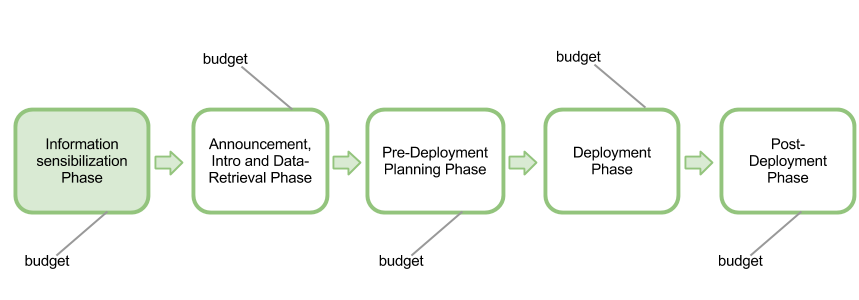Types / Categories of Questions related to getting to a full deployment of OLPC XO laptops and XS-Schoolservers
The viewpoints expressed hereunder do not necessarily reflect the opinion of OLPC.
This page was created by a member of the free volunteer community supporting OLPC.
Why do certain OLPC lab deployments get to full country wide deployments and other not?
- IMHO it's maybe a good thing to deal with this question from the back to the front and back. I mean: in the end you it will be the minister of education who will have to give a green light. Probably also the prime minister, the minister of finance and the president as well. You will never get the door slammed on your nose because you come with a great idea and project. Things got considerably easier since the first countries placed orders for a full roll out and there is a lot of experience and capacity out there. Of course one needs a good sets of documents and understanding of the decision making process. Nobody/no minister is going to write out a blanco check just like that. Probably one needs to go through a couple of stages.
With the info on the deployment pages, you will make it to the Minister of Education or the cabinet quite easily. But then you have to ask them for a budget to get to the next stage: a series of lectures, workshops, consulting the educational landscape, allowing you to understand how the educational landscape is organized. In the below answer by Nicholas NEGROPONTE and also my experiences here in Europe, is that when the educational landscape involves many players like in the USA some 15.000 school districts, or in Belgium Europe also some 500 different school networks, the information-sensibilization-capacity building phase will require more time and resources and focus than in e.g. Uruguay where things were much straightforward. More: deployments.
- Here's what Prof. Nicholas NEGROPONTE replies to that: Maney: If you’ve been able to change the conversation in places like Uruguay, about programming being important to education, I don’t have a sense that that’s happened in the U.S. at all.
Negroponte: The U.S. is a much harder problem. The system itself is part of the problem. Last I looked there were 15,000 school districts. How do you deal with 15,000 districts? You can’t really make the kinds of changes we found ourselves able to do in Ethiopia, Rwanda, Uruguay or Peru. So it’s a harder problem, the way it’s organized the way it’s financed. More: http://newsroom.cisco.com/feature/1240339/Network-Trailblazer-A-Conversation-with-Nicholas-Negroponte-Founder-One-Laptop-per-Child?utm_medium=rss
- Here's what Pablo_Mandeville replies to that.
